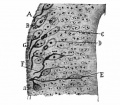File:Bailey387.jpg: Difference between revisions
From Embryology
No edit summary |
mNo edit summary |
||
| (One intermediate revision by the same user not shown) | |||
| Line 1: | Line 1: | ||
==Fig. 387. Dorsal portion of the lumbar cord of a chick embryo of three days== | ==Fig. 387. Dorsal portion of the lumbar cord of a chick embryo of three days== | ||
[[Embryology History - Santiago Ramón y Cajal|Cajal]] drawing. | |||
A, B, Cells in the apolar stage with fibrillogenous zones; B shows transition to the bipolar stage; E, further advanced bipolar cell; G, cells in monopolar stage or neuroblasts of His; a, giant cone of growth. These cells have migrated to the outer part of the nuclear layer, thereby forming the beginning of the mantle layer. | A, B, Cells in the apolar stage with fibrillogenous zones; B shows transition to the bipolar stage; E, further advanced bipolar cell; G, cells in monopolar stage or neuroblasts of His; a, giant cone of growth. These cells have migrated to the outer part of the nuclear layer, thereby forming the beginning of the mantle layer. | ||
{{ | {{Bailey 1921 Figures}} | ||
[[Category:Chicken]] [[Category:Neural]] [[Category:Cajal]] | [[Category:Chicken]] [[Category:Neural]] [[Category:Cajal]] | ||
Latest revision as of 08:39, 23 June 2015
Fig. 387. Dorsal portion of the lumbar cord of a chick embryo of three days
Cajal drawing.
A, B, Cells in the apolar stage with fibrillogenous zones; B shows transition to the bipolar stage; E, further advanced bipolar cell; G, cells in monopolar stage or neuroblasts of His; a, giant cone of growth. These cells have migrated to the outer part of the nuclear layer, thereby forming the beginning of the mantle layer.
- Text-Book of Embryology: Germ cells | Maturation | Fertilization | Amphioxus | Frog | Chick | Mammalian | External body form | Connective tissues and skeletal | Vascular | Muscular | Alimentary tube and organs | Respiratory | Coelom, Diaphragm and Mesenteries | Urogenital | Integumentary | Nervous System | Special Sense | Foetal Membranes | Teratogenesis | Gallery of All Figures
| Historic Disclaimer - information about historic embryology pages |
|---|
| Pages where the terms "Historic" (textbooks, papers, people, recommendations) appear on this site, and sections within pages where this disclaimer appears, indicate that the content and scientific understanding are specific to the time of publication. This means that while some scientific descriptions are still accurate, the terminology and interpretation of the developmental mechanisms reflect the understanding at the time of original publication and those of the preceding periods, these terms, interpretations and recommendations may not reflect our current scientific understanding. (More? Embryology History | Historic Embryology Papers) |
Reference
Bailey FR. and Miller AM. Text-Book of Embryology (1921) New York: William Wood and Co.
Cite this page: Hill, M.A. (2024, April 18) Embryology Bailey387.jpg. Retrieved from https://embryology.med.unsw.edu.au/embryology/index.php/File:Bailey387.jpg
- © Dr Mark Hill 2024, UNSW Embryology ISBN: 978 0 7334 2609 4 - UNSW CRICOS Provider Code No. 00098G
File history
Click on a date/time to view the file as it appeared at that time.
| Date/Time | Thumbnail | Dimensions | User | Comment | |
|---|---|---|---|---|---|
| current | 00:36, 30 January 2011 |  | 507 × 442 (50 KB) | S8600021 (talk | contribs) | ==Fig. 387. Dorsal portion of the lumbar cord of a chick embryo of three days== Cafal. A, B, Cells in the apolar stage with fibrillogenous zones; B shows transition to the bipolar stage; E, further advanced bipolar cell; G, cells in monopolar stage or |
You cannot overwrite this file.
File usage
The following 4 pages use this file:
